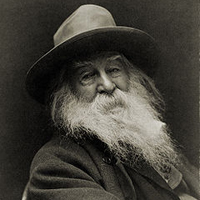Song of Myself Section 6 by Walt Whitman: Summary and Analysis
By the sixth section, Whitman has established the setting, mood, and tone, and has also introduced the basic themes of the poem. In the 6th section, he adds a typical dimension to the poem's setting: A child brings a handful of grass and asks him what it is, and he has to go on guessing, puzzled. This section is often read as an independent poem also.

Walt Whitman (1819-1892)
The poet's pondering upon the grass gives rise to several guesses, in his attempt of interpreting the blade of grass. Though the poet is basically ignorant about the significance of grass, he does make some thematically significant guesses. First, he says that it is so enigmatic and mysterious that he doesn't know any more than the child does. Indeed, the transcendence and mystical value of grass is never fully knowable. Then he guesses that it must be "a flag of my disposition (temperament); and so it is. It is the emblem (flag) of man's nature/tendency in terms of existence. Next he guesses that it might be the "handkerchief of the Lord/ A scented gift and remembrancer designedly (intentionally) dropped.. bearing the owner's name... so that we may see and say Whose?" This guess is even more significant. Handkerchief could be symbolic of a loving gift, a `remembrancer', as he says, and a signal that the good god is present in the manifestation of the nature's beautiful things like the grass. Furthermore, the grass is also a thing that draws man's attention towards nature. The grass, as he guesses next, could also be a child. Or it could be a hieroglyphic, a thing that is not easily readable. It is something that grows among the black folks as among the white; it is the same child, whether it is born among the Kanuck (French-Canadian, whatever origin), a Tuckahoe (Virginian lowlander, whatever region), Congressman (whatever political affiliation), Cuff (Afro-American, whatever color). It then seems to him like the beautiful uncut hair of graves; note that this is connotative of what can conventionally be called vulgar. Then he speaks to the grass, saying that it might have from the breasts of young men, or from old people, or from infants taken early to be buried. The grass might well have grown from the mouth of buried men: this reminds the speaker of the notion of expression. Grass is itself expression; it has "so many uttering tongues". He wishes that he could translate the hints of those people who died without having the chances to speak. The several guesses about the meaning of grass can be summed up by saying that grass is the symbol of the transcendence of life, because it represents the cycle or the chain of life (living beings come from the nature and go back to nature). It comes as a mediator between the intelligent beings and the material nature, being a 'living' ‘thing'. The speaker comes to the conclusion that if life goes on and on in a cycle of beings, mediated by the grass, then: "the smallest sprout shows there is really no death/ And if ever there was it led forward life".
Indeed, there is death, but it is there just to lead life forward: it leads the collective life of the loving beings forward, for though the individual dies, the chain of being remains. The unity and interrelationship between all things in the world provides a transition for Whitman to his mystical impression of the grass. For Whitman, the grass is not simply a separate and distinct growth but is part of all things. It has an identity with them and represents their unity and transformation from one form to another in a cycle of life, death and rebirth. Whitman's notion of life and death does not follow the more orthodox religions in which a conscious and purely spiritual existence is lived after a moral life span. Death for him does not represent any break a halting in the flow of life. If matter goes on, then life and the spirit go on. In the idea of reincarnation, there is a sense of continuality and deep satisfaction for the poet. The infinite, eternally sprouting grass is both the symbol of and a functioning part of Whitman's forward regenerating movement of all life. "All goes onward and outward, nothing collapses, and to die is different from what anyone (has) supposed, and luckier". This section ends with the affirmation of the transcendence, though the guessing seems to be a product of an unenlightened understanding.
Site this Page!
Shrestha, Roma. "Song of Myself Section 6 by Walt Whitman: Summary and Analysis." BachelorandMaster, 21 Mar. 2018, bachelorandmaster.com/britishandamericanpoetry/song-of-myself-summary-analysis-section-6.html.
Related Topics
The World Below the Brine: Analysis
When Lilacs Last in the Dooryard Bloom'd: Analysis
Crossing Brooklyn Ferry: Summary
Crossing Brooklyn Ferry: Analysis
Song of Myself (Section 1: Summary & Analysis)
Song of Myself (Section 11: Summary & Analysis)
Song of Myself (Section 52: Summary & Analysis)
 |
bachelorandmaster.com |